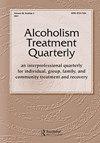瑞典足球支持者关于酒精、药物使用和治疗需求的叙述:一项解释性现象学分析访谈研究
IF 0.9
Q4 SUBSTANCE ABUSE
引用次数: 1
摘要
摘要众所周知,忠诚的足球支持者会大量饮酒,有时还会吸食毒品。然而,研究并没有检验忠诚的支持者是如何看待药物使用的,以及他们有什么治疗需求。在这项研究中,七名敬业的支持者接受了采访,了解他们对支持者文化的看法、支持者文化的关系方面、药物使用模式和治疗需求。访谈采用解释性现象学分析法进行分析。参与者无法想象没有酒精的支持者文化。三名参与者在使用物质方面遇到困难。所有人都对支持者的药物使用模式持矛盾态度,并理解其中的风险。同时,他们欣赏支持者文化所提供的支持、熟悉感和成为更大事物一部分的感觉。一些人感觉到,这种陪伴可能会支持那些与物质作斗争的人。其他人则感觉到该团体的亲密关系阻碍了康复。与会者强调了机构和责任,并认为人们需要理解为什么选择加入一个以与传统男性理想相关的物质使用模式为特征的群体。因此,评估和治疗需要以人为中心,承认选择、背景、通过药物使用产生的性别行为,以及背景是否会支持或阻碍康复。本文章由计算机程序翻译,如有差异,请以英文原文为准。
Dedicated Swedish Football Supporters’ Narratives about Alcohol and Drug Use and Treatment Needs: An Interpretative Phenomenological Analysis Interview Study
ABSTRACT It is known that dedicated football supporters consume large amounts of alcohol, and sometimes drugs. Yet, studies have not examined how dedicated supporters perceive substance use, and what treatment needs they have. In this study, seven dedicated supporters were interviewed about their perceptions of supporter culture, the relational aspects of it, substance use patterns, and treatment needs. The interviews were analyzed using interpretative phenomenological analysis. The participants could not imagine supporter culture without alcohol. Three participants had experienced difficulties with substances. All were ambivalent about substance use patterns among supporters and understood the risks. Simultaneously, they appreciated the support, familiarity, and sense of being part of something larger that supporter culture provided. Some sensed that the companionship could be supportive for those struggling with substances. Others sensed that the closeness of the group hindered recovery. Participants underlined agency and responsibility and sensed that one needs to understand why one made the choice to be part of a group that was characterized by substance use patterns connected to traditional masculine ideals. Therefore, assessment and treatment need to be person-centered, acknowledge choices, the context, the gendered behaviors that are enacted through substance use, and whether the context could support or hinder recover.
求助全文
通过发布文献求助,成功后即可免费获取论文全文。
去求助
来源期刊

Alcoholism Treatment Quarterly
SUBSTANCE ABUSE-
CiteScore
1.60
自引率
11.10%
发文量
31
期刊介绍:
Alcoholism Treatment Quarterly is an exciting professional journal for clinicians working with persons who are alcoholic and their families. Designed to bridge the gap between research journals and information for the general public, it addresses the specific concerns of professional alcoholism counselors, social workers, psychologists, physicians, clergy, nurses, employee assistance professionals, and others who provide direct services to persons who are alcoholic. The journal features articles specifically related to the treatment of alcoholism, highlighting new and innovative approaches to care, describing clinical problems and solutions, and detailing practical, unique approaches to intervention and therapy.
 求助内容:
求助内容: 应助结果提醒方式:
应助结果提醒方式:


